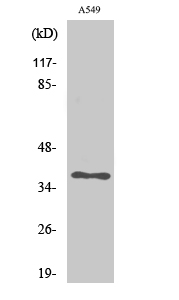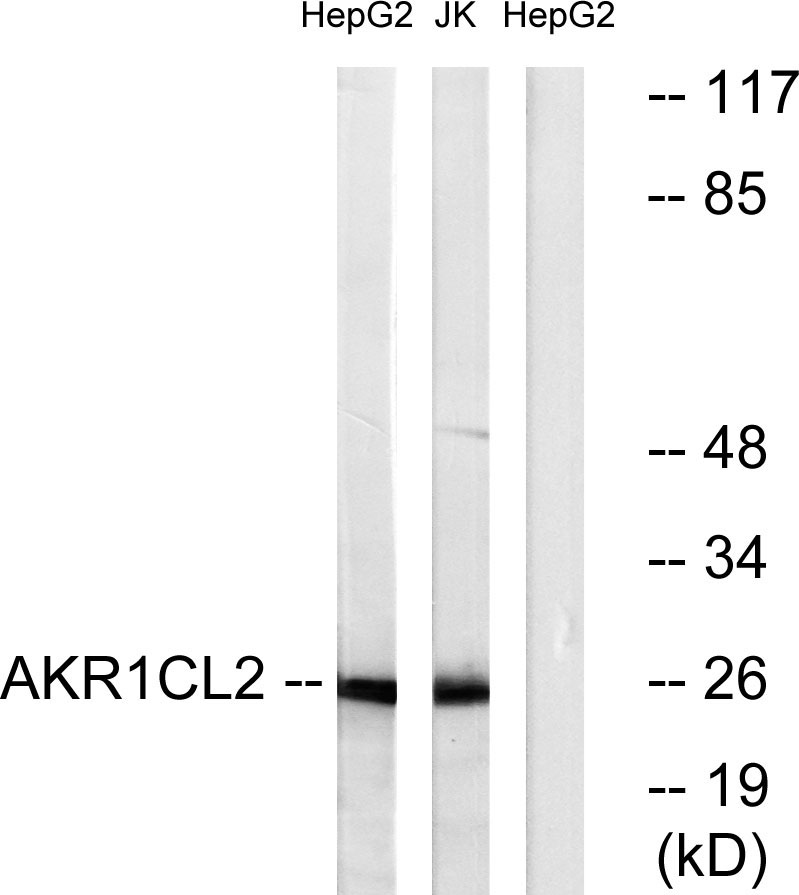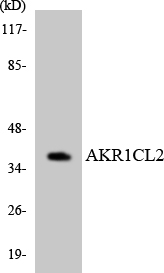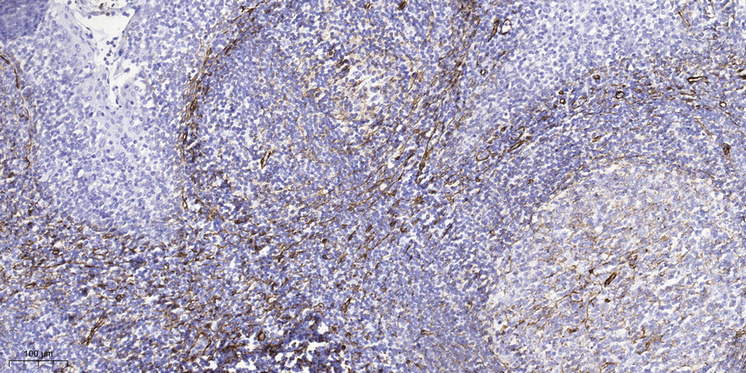AKR1CL2 Polyclonal Antibody
- Catalog No.:YT0171
- Applications:WB;IHC;IF;ELISA
- Reactivity:Human;Rat;Mouse;
- Target:
- AKR1CL2
- Gene Name:
- AKR1E2
- Protein Name:
- 1,5-anhydro-D-fructose reductase
- Human Gene Id:
- 83592
- Human Swiss Prot No:
- Q96JD6
- Mouse Swiss Prot No:
- Q9DCT1
- Immunogen:
- The antiserum was produced against synthesized peptide derived from human AKR1CL2. AA range:141-190
- Specificity:
- AKR1CL2 Polyclonal Antibody detects endogenous levels of AKR1CL2 protein.
- Formulation:
- Liquid in PBS containing 50% glycerol, 0.5% BSA and 0.02% sodium azide.
- Source:
- Polyclonal, Rabbit,IgG
- Dilution:
- WB 1:500 - 1:2000. IHC 1:100 - 1:300. ELISA: 1:10000.. IF 1:50-200
- Purification:
- The antibody was affinity-purified from rabbit antiserum by affinity-chromatography using epitope-specific immunogen.
- Concentration:
- 1 mg/ml
- Storage Stability:
- -15°C to -25°C/1 year(Do not lower than -25°C)
- Other Name:
- AKR1E2;AKR1CL2;AKRDC1;1;5-anhydro-D-fructose reductase;AF reductase;Aldo-keto reductase family 1 member C-like protein 2;Aldo-keto reductase family 1 member E2;LoopADR;Testis-specific protein;hTSP
- Observed Band(KD):
- 37kD
- Background:
- The protein encoded by this gene is a member of the aldo-keto reductase superfamily. Members in this family are characterized by their structure (evolutionarily highly conserved TIM barrel) and function (NAD(P)H-dependent oxido-reduction of carbonyl groups). Transcripts of this gene have been reported in specimens of human testis. Alternative splicing results in multiple transcript variants. [provided by RefSeq, Aug 2012],
- Function:
- catalytic activity:1,5-anhydro-D-glucitol + NADP(+) = 1,5-anhydro-D-fructose + NADPH.,function:Catalyzes the NADPH-dependent reduction of 1,5-anhydro-D-fructose (AF) to 1,5-anhydro-D-glucitol. Can also catalyze the reduction of various aldehydes and quinones.,similarity:Belongs to the aldo/keto reductase family.,tissue specificity:Testis-specific.,
- Subcellular Location:
- Cytoplasm .
- Expression:
- Specifically expressed in testis (PubMed:12604216, PubMed:15118078). Expressed in testicular germ cells and testis interstitial cells (PubMed:15118078).
- June 19-2018
- WESTERN IMMUNOBLOTTING PROTOCOL
- June 19-2018
- IMMUNOHISTOCHEMISTRY-PARAFFIN PROTOCOL
- June 19-2018
- IMMUNOFLUORESCENCE PROTOCOL
- September 08-2020
- FLOW-CYTOMEYRT-PROTOCOL
- May 20-2022
- Cell-Based ELISA│解您多样本WB检测之困扰
- July 13-2018
- CELL-BASED-ELISA-PROTOCOL-FOR-ACETYL-PROTEIN
- July 13-2018
- CELL-BASED-ELISA-PROTOCOL-FOR-PHOSPHO-PROTEIN
- July 13-2018
- Antibody-FAQs
- Products Images

- Western Blot analysis of various cells using AKR1CL2 Polyclonal Antibody diluted at 1:500

- Western blot analysis of lysates from HepG2 and Jurkat cells, using AKR1CL2 Antibody. The lane on the right is blocked with the synthesized peptide.

- Western blot analysis of the lysates from HT-29 cells using AKR1CL2 antibody.

- Immunohistochemical analysis of paraffin-embedded human tonsil. 1, Tris-EDTA,pH9.0 was used for antigen retrieval. 2 Antibody was diluted at 1:200(4° overnight.3,Secondary antibody was diluted at 1:200(room temperature, 45min).



